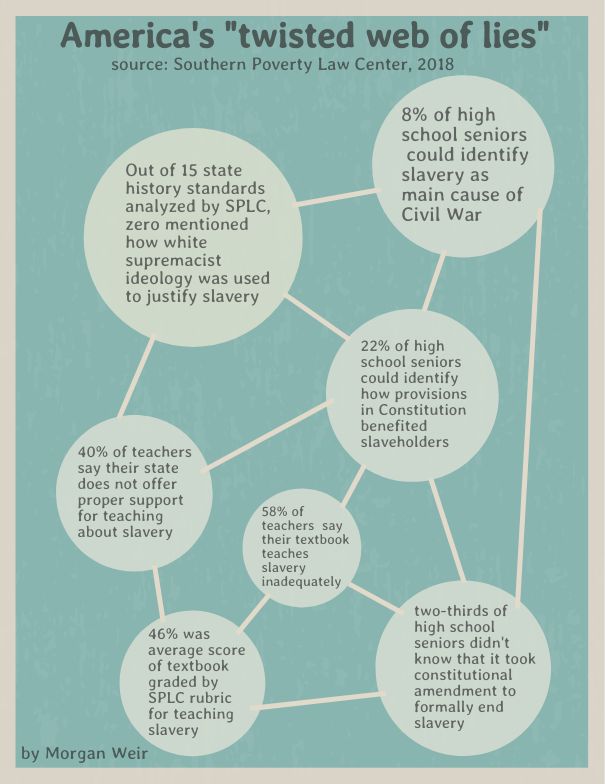America needs to confront its history
The proposed 1776 Commission would be a disservice to the country
President Donald Trump was right when he referred to America’s history education as a “twisted web of lies,” but it’s not because of a heavy emphasis on slavery, as the Southern Poverty Law Center found in their study.
September 30, 2020
In a speech on September 17, President Donald Trump announced plans to create an education commission that would develop a “pro-American curriculum.” It will be called the 1776 Commission, a nod to the New York Times’ 1619 Project which looks at American history from the time the first enslaved people were brought across the Atlantic. In his speech, the president referred to the project as “toxic propaganda” and claimed that educating students about America’s history of slavery and racism teaches them to hate their country.
There is clear political motive behind this decision. Racial injustice has become a prominent talking point as Election Day comes closer. Trump is playing to his pro-American base who largely agree with Trump that the “miracle of American history” should be celebrated, and any part of history which contradicts that should be ignored. The ultimate goal with this commission is not to educate students properly, it is to censor American history so that it fits a political narrative.
It also serves to equate American history with white history. Social studies classes in the United States are already deeply eurocentric. To suggest that showcasing the stories and struggles of non-white people throughout U.S. history to any extent is, as Trump put it, “a form of child abuse,” is ignorant. Trump said that to teach the full history of America, including its flaws, is to “bully Americans into abandoning their values, their heritage and their way of life.” However, the lives and heritage of Americans who are descendants of slaves and other marginalized people are just as important. It’s unfair to exclude entire groups of people from history just to make a country look good.
Some people are calling into question how much influence the president can actually exert over education. States, not the federal government, are the ones who set and regulate curriculum for schools. The government can cut federal funding to states for education, as Trump threatened to do when California integrated the 1619 Project into their curriculum, but only around 8% of the national funding for education comes from the federal government in the first place, according to the U.S. Department of Education. Clearly, this commission is a symbolic gesture meant to stir up support before the election, not an actual solution to any perceived problem.
Regardless of whether this political move will lead to tangible change in schools, it does have broader implications for education in general. It is stirring up a lot of conversations about whether history classes in America are fair and accurate. It is also raising the question of whether this country is moving towards using education as propaganda and where to draw that line. Education should not be about indoctrination. It should be about teaching students true, nuanced history and giving them the space to critically question and analyze that history. To make history class a chance to spread propaganda— to lie to students, bury the truth and not teach facts—is not only ignorant but dangerous.
American history classes are a “twisted web of lies” as Trump said in his speech, but not in the way the president thinks. In 2018, the Southern Poverty Law Center (SPLC) found that schools are unequipped to teach about the history of slavery properly. Teachers don’t have the tools and textbooks don’t include enough in-depth material, so students don’t fully understand its history and consequences. History classes don’t teach students about the brutal reality behind slavery, the white supremacist motives behind it or its modern-day legacy. There have been countless stories within recent years of schools asking students to name “positive aspects” of slavery, holding mock slave auctions, or talking about “kindly” slave-owners who “took good care” of enslaved people. When surveyed by the SPLC, many high schoolers lacked basic knowledge about slavery. Less than half correctly answered that slavery was legal in all colonies during the American Revolution, and only 8% identified that slavery was the main cause of the Civil War. It is critical that students not only know the basic facts regarding America’s past, but also that they are given the tools to analyze its impacts. The 1776 Commission discourages that.
Through the commission, Trump is attempting to reinforce the idea that it is unpatriotic to criticize any aspect of America. In his speech, he said that acknowledging the country’s true history would destroy the “civic bonds that tie us together.” However, when left unacknowledged, the painful, cruel details of the past inevitably end up tearing us apart. A survey from Pew Research Center found that 71% of U.S. voters agree that acknowledging the country’s flaws makes the U.S. stronger. Ignoring the imperfections from a country’s past doesn’t make the country perfect. Teaching about those imperfections will allow people to confront those issues and make the country better for the future.
A country can teach history a lot of different ways. A president can set in place as many laws and commissions as he wants in order to convince people that their nation is flawless. Schools can push whichever narrow, incomplete version of events they choose to. However, none of that is going to rewrite the history of America. No amount of propaganda will undo the legacy of slavery, the impact of segregation or the effects of racism’s roots in this country.







